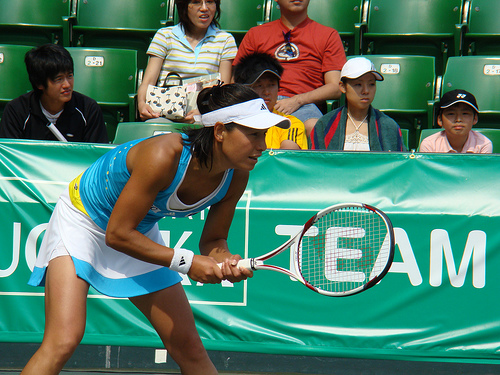 (c) Spicks & Specks
(c) Spicks & Specks
素晴[すば]らしいニュースです。日本[にほん]のテニス・プレーヤー、クルム伊達[だて]が韓国[かんこく]オープンで優勝[ゆうしょう]しました。
Fantastic! Date Krumm, one of the finest Japanese female tennis players won at Korea Open.
クルム伊達[だて]は(Note: she is married to a German guy, that’s why her current name is Date Krumm)現在[げんざい]39歳[さい]。10年[ねん]近[ちか]く前[まえ]に実[じつ]は引退[いんたい]した(intai suru means to retire)のですが、2年前[ねんまえ]に復帰[ふっき]しました。そしてこの週末[しゅうまつ]、韓国[かんこく]オープンで優勝[ゆうしょう]! 39歳[さい]ですよ、すごい、すごい!
彼女[かのじょ]の優勝[ゆうしょう]についての新聞[しんぶん]記事[きじ]を読[よ]んで、面白[おもしろ]いなあと思[おも]ったことがありました。以下[いか]は英語[えいご]のサイトからの引用[いんよう](inyo means citation)です:
"Above all, my husband’s love was a big help for my win," she [= Date Krumm] said.
これはとても英語[えいご]らしいなあ、と思[おもpan>]いました。Loveは日本語[にほんご]に訳[やく]すると愛[あい]ですが、日本語[にほんご]では絶対[ぜったい]「夫[おっと]の愛[あい]が…」なんて言[い]いません! 日本語[にほんご]ではどのように報[ほう]じられている(hoojiru means to report)んだろう、と思[おも]っていろいろ探[さが]してみました。そうしたらやっぱり「夫[おっと]のサポートで」とありました。
日本語[にほんご]と英語[えいご]の違[ちが]い(chigai means difference)って面白[おもしろ]いですね。
Date Krumm (Note: she is married to a German guy, that’s why her current name is Date Krumm)is now 39 years old. She retired nearly 10 years ago but came back about 2 years ago. And then! She won the title at Korea Open this weekend. This is absolutely fantastic news!
When I read an article reporting her winning on the Internet in English, I found the following:
"Above all, my husband’s love was a big help for my win," she [= Date Krumm] said.
This is really interesting because… we would never ever NEVER say “my husband’s LOVE” in Japanese no matter what!! I wondered how Japanese newspapers reported and did quick search. What I found in Japanese was “my husband SUPPORT…” A-ha!
Isn’t it interesting!?
Miguel says:
When could you use the word “love” in a newspaper? When is the word used in Japan? Only between lovers?
Fumiko Nishimura says:
Hi Miguel: Thank you for your question… um it is not easy to answer though!
In general, we are not supposed to talk about “love” in public – even parents would not say “I love my children” or anything like that. Of course Japanese parents love their children as same as any other parents in the world. When we want to express our feelings towards our loved ones, we simply use some other expressions rather than “love” (for example, he is very important to me, my son is my treature, or something like that…). When somebody like Date Krumm is in public, i.e. at a press conference, she is not expected to use the word “love” in Japanese, I do not think. When I read the article in English, it sounded okay but I was so certain that she did not use the word when she was interviewed in Japanese.
I suppose we could use the word “love” as a descriptive word – not saying “I love you” to somebody in person or describing your own personal situations, but describing something else in a very abstract way…
The younger generations have received a lot of influence from Western countries, so they might use “I love you” between lovers, couples etc. in Japanese and they might not mind using the word in public.